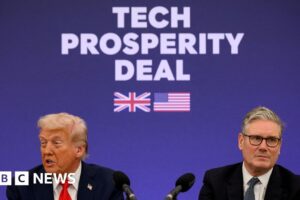
In November 2022, as Europe grappled with an escalating energy crisis, Germany sealed a deal with Qatar to import up to 2 million tons of liquefied natural gas (LNG) annually from the Gulf state.
The agreement, due to start in 2026, was part of Europe’s broader strategy to reduce reliance on Russian gas following Russia’s full-scale invasion of Ukraine.
Nearly three years later, Qatar has threatened to halt LNG deliveries to Europe in a row over a European Union directive aimed at improving ethical standards in global trade.
German newspaper Welt am Sonntag reported last weekend (July 26/27) that Qatari authorities have written to several EU governments urging the EU to revise the directive.
The letters warned that, without substantial changes, Qatar may redirect LNG exports to markets offering a “more stable and business-friendly environment.”
EU accountability law under fire
The EU’s Corporate Sustainability Due Diligence Directive (CSDDD), adopted last year, orders large European firms to scrutinize their global supply chains — from raw materials to finished products — to spot and fix issues like human rights abuses or environmental harm.
The directive also mandates that companies develop climate transition plans aligned with the 2015 Paris Agreement.
While the CSDDD has been praised by human rights and environmental advocates, it has drawn criticism from industry groups and non-EU suppliers for its high compliance costs, administrative burden and international legal scope.
How hackers could take down Europe’s power supply
To view this video please enable JavaScript, and consider upgrading to a web browser that supports HTML5 video
Qatar complained that the directive’s climate protection rules “go beyond the objectives and intentions” of the Paris Agreement, adding that “high fines, penalties, and civil liability for noncompliance” pose a risk for state-owned QatarEnergy, the world’s largest LNG producer.
Energy-rich Qatar balks at net-zero goals
The CSDDD conflicts with Qatar’s national energy strategy. The Gulf country’s economy is deeply tied to LNG, which it sees as a “green” transition fuel rather than a climate liability.
Qatar says it wants to make gradual, measurable progress towards carbon-neutrality, without undermining its energy exports.
“Qatar and some other oil producers and exporters have not yet put net-zero pathways in place,” Andreas Goldthau, a public policy professor at the University of Erfurt in Germany, told DW. Goldthau said this puts them at risk of EU penalties for failure to comply with the CSDDD.
Under the directive, firms could face fines of up to 5% of global annual turnover if they don’t carry out due diligence checks. For QatarEnergy, which reported $48.6 billion (€42.2 billion) in revenue for 2024, that could translate to a $2.43 billion penalty.
Qatar ramped up LNG supplies over Ukraine war
Qatar’s wealth is backed by the world’s third-largest natural gas reserves and oil reservesImage: Karim Jaafar/AFP
Since the Ukraine war began, Qatar has supplied 12-14% of Europe’s LNG needs, according to data provider Kpler, sending a total of 37.1 million metric tons of the gas to the bloc. The 2022 deal with Germany is expected to further boost Europe’s supply.
Analysts warn that any disruption to these volumes, especially during peak winter demand, could tighten supply and trigger a renewed surge in energy prices.
Thierry Bros, a professor at Sciences Po University in Paris, told DW that it was “unsurprising” that Qatar was now threatening supplies as “no company” wants to be exposed to an “overly complex and burdensome piece of legislation.”
“Instead of entering protracted negotiations, Qatar has chosen a more assertive approach — acting early and decisively to position itself for a full exemption from the directive,” he said.
EU delays CSDDD rollout after intense lobbying
EU states were initially expected to turn the CSDDD into national legislation by next year, initially targeting firms with more than 5,000 employees and annual turnovers of over €1.5 billion. By 2029, smaller firms with headcounts of 1,000 or more will be required to comply.
But faced with growing pushback from the likes of Germany, France and Italy, as well as the finance and energy sectors, the EU has now proposed a two-year delay, till June 2028.
“The EU already relaxed some of those requirements, pushing some back into the second half of the decade,” said Goldthau.
A key legal question now looms: Can Brussels legitimately impose steep fines on non-EU firms like QatarEnergy? Experts believe practical challenges and trade implications may complicate any enforcement action. If not, the financial burden may shift to its European partners.
“Importers with legal entities within Europe could be asked to withhold payments to QatarEnergy as fines by proxy,” Goldthau speculated.
Germany starts building its own LNG terminal
To view this video please enable JavaScript, and consider upgrading to a web browser that supports HTML5 video
Qatar’s threat: Right move, wrong moment?
Qatar’s move may be strategically sound, but its timing has raised eyebrows. Some analysts believe Qatar is leveraging the recent US-EU trade tensions to push for an exemption.
But just this weekend, Brussels agreed $750 billion (€650 billion) worth of US LNG purchases as part of the tariff deal with US President Donald Trump, dealing a major blow to the country’s approach.
“I’m puzzled why Qatar put this forward right now,” Goldthau told DW. After all, he added, Trump has just struck a deal that gives Brussels another excuse to “pivot to the US.”
But Bros sees it differently, believing that Qatar’s move is well timed to capitalize on Europe’s lingering vulnerability from the post-Ukraine energy crisis.
“The LNG market remains tight and will likely stay that way for another three years, giving Qatar significant leverage at precisely the right moment to exert pressure,” he said.
With global LNG demand projected to rise to over 600 million tons per annum by 2030, Qatar’s North Field expansion and long-term contracts help position the emirate as a critical energy supplier to Europe.
But if EU regulations become too burdensome, Qatar may accelerate its pivot to Asia, where demand is booming and compliance costs are much lower.
Edited by: Uwe Hessler





